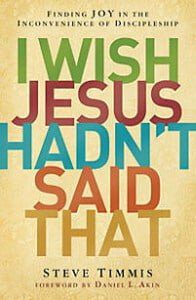⏱️ Estimated Reading Time: 5 min read
 There are likely many commands we read throughout the Scriptures that we tend to try and avoid. Not purposely perhaps, but our avoidance seems to fall under the overall category of “Do I really have to obey that one Lord?” The other issue we have with certain statements made in Scripture is quite frankly our ignorance of exactly what Jesus is driving at when he tells us to love our neighbor or that we cannot serve God and mammon. What is mammon anyway? Steve Timmis, in his excellent book I Wish Jesus Hadn’t Said That, explores ten very familiar statements from Jesus that we often either overlook or misunderstand, statements that truly define what it means to be a follower of Jesus.
There are likely many commands we read throughout the Scriptures that we tend to try and avoid. Not purposely perhaps, but our avoidance seems to fall under the overall category of “Do I really have to obey that one Lord?” The other issue we have with certain statements made in Scripture is quite frankly our ignorance of exactly what Jesus is driving at when he tells us to love our neighbor or that we cannot serve God and mammon. What is mammon anyway? Steve Timmis, in his excellent book I Wish Jesus Hadn’t Said That, explores ten very familiar statements from Jesus that we often either overlook or misunderstand, statements that truly define what it means to be a follower of Jesus.
I will state right up front in this review that this was one of the most challenging books on a personal level I have read in 2014 and I read and reviewed over 150 books in 2014. There are just some books that truly hit home and authors who have the ability to unpack important and fundamental truths of Scripture in a way that quite frankly helps difficult concepts make perfect sense. Timmis throughout this book does just that very thing, namely taking a topic such as loving your neighbor and demonstrating for the reader exactly what Jesus meant by that command. After reading this book, one will have for example complete clarity what it means to love your neighbor, who your neighbor is, and why such a command is so vital to being a disciple of Jesus.
There are certainly more lengthy books available that tackle subjects such as the proper approach to money, how to combat anger, or what it means for the church to have a missional posture. There are texts that will engage the minutiae of every passage in Scripture related to why we should forgive those who have wronged us. With that said, I have not read many books that have been able to capture the true underlying message found in Scripture in a compact yet comprehensive manner as has been accomplished by Timmis in this particular book. High praise for sure so let me share a clear example of why I have made such a bold endorsement.
In the chapter titled You Cannot Serve Both God and Money, Timmis drills down to what Jesus meant in Luke 16:13 which states “No one can serve two masters. Either you will hate the one and love the other, or you will be devoted to the one and despise the other. You cannot serve both God and money.” Some translations say “You cannot serve both God and mammon” given that term provides a more precise rendering of the original language, namely the word mamōnas which is an Aramaic word. Timmis aptly comments that mammon “seems to have carried with it the idea of “confidence” or something in which to trust. The way Jesus contrasts it with God shows that he sees it as an object of worship. The two compete with each other for our affection and service.” Essentially, Jesus is identifying in Luke 16:13 two things that compete for our love and devotion, that of love for God and worship of Him in all of life or the opposing position of love and devotion for the things of the world. Jesus is noting that one cannot at the same time express complete love and affection for God while having their heart drawn towards love for temporal things. When we are in love with God, we are able to be generous towards others. Furthermore, as Timmis so capably states, “When our hearts are captivated by Jesus and overwhelmed at his abundant generosity towards us, we will give generously.”
As you can see, this is not just an issue of dollar bills. It is an issue that sheds light on a broader spectrum of life, thus revealing who it is we love. When are in love with Jesus and desire to serve Him with all we are, we can then better understand what it means to love our neighbor, to be angry yet not sin, to go into all the world and share the good news of the gospel, and to forgive because we have been so graciously forgiven of our massive debt of sin. Timmis captures all of these issues in this excellent book, noting to the reader the crux of what Jesus is saying to us in these statements and why we should be thankful Jesus said all of these statements.
I highly recommend this book for all believers. Timmis reveals the truthfulness of the subtitle to his book, that of “finding joy in the inconvenience of discipleship.” Is it easy to love our neighbor or to forgive those who have wronged us? Of course not; however, we must, not simply to check a box to portray ourselves are more religious than others, but rather because in being obedient to these commands, we will bring glory to God and in turn will grow closer in love and affection for our Savior.
This book is available for purchase from Zondervan by clicking here.
I received this book for free from Zondervan for this review. I was not required to write a positive review. The opinions I have expressed are my own. I am disclosing this in accordance with the Federal Trade Commission’s 16 CFR, Part 255 : “Guides Concerning the Use of Endorsements and Testimonials in Advertising.”



